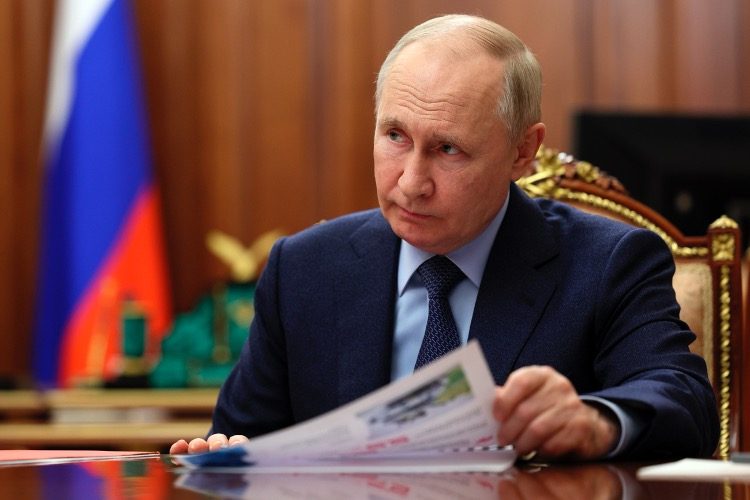
With 2023 now in the rear-view mirror, it’s worth taking a look back to assess the state of global politics. Where does America stand now in contrast to other major powers, and who were the major winners and losers of the year?
It’s arguable that, despite remaining embroiled in a costly and drawn-out war with Ukraine, Russian President Vladimir Putin has scored a number of victories on the world stage: The Russia-China BRICS alliance is gaining momentum, and Moscow is increasingly coming to replace the United States as the dominant outside power in the Middle East, as evidenced by closer ties to regional powers such as Saudi Arabia and Iran.
And, of course, Russia, working vicariously through the Houthi proxies of its ally Iran, is effectively shutting the United States out of the crucial Red Sea trade while securing its own access to those waters.
Part of the Kremlin’s success is due to ample political maneuvering on Putin’s part — under his leadership, Russia has, for years now, worked assiduously to make itself independent of the U.S.-led global economic order, allowing itself to pursue its own interests without the fear that western sanctions will bring the country to a complete halt.
But Putin’s astuteness extends to another key sphere in political warfare: The use of propaganda.
While the Left has turned “Russian election interference” into a trope by which to censor rivals on the Right, it also cannot be denied that Russia, like any other major state (including the United States) makes use of propaganda in order to win support for its program abroad.
Given that most major nations today have representative governments of some form, states that want to successfully effect the policy of other countries must not only target elected politicians and unelected policymakers (bureaucrats, think tanks, academics, etc.); they must tailor their propaganda to the citizenry — the voters who elected and put pressure on politicians.
Accordingly, it’s clear that Vladimir Putin has very deliberately been attempting to court the American public, especially segments of the Right that are legitimately frustrated with the direction of the Biden administration.
For example, Putin has pounced at several opportunities to show sympathy for the plight of Donald Trump and his supporters. He has defended January 6 protesters who have been persecuted by federal authorities for years now, arguing that they had legitimate demands. He has spoken out against the “disorder” of America’s Black Lives Matter movement — a common object of scorn among American conservatives.
As recently as September, Putin publicly called the U.S. political system “rotten” in reference to the ongoing prosecution of Trump.
“As for the prosecution of Trump, for us what is happening in today’s conditions, in my opinion, is good because it shows the rottenness of the American political system, which cannot pretend to teach others democracy,” said Putin. “Everything that is happening with Trump is the persecution of a political rival for political reasons. That’s what it is. And this is being done in front of the public of the United States and the whole world.”
It isn’t only Putin’s remarks on Trump and MAGA directly that have endeared him to many Americans. Several of his government’s stances have won him the support of conservatives who express a desire that the government in the U.S. would do the same.
This is most seen when it comes to social issues, including Russian legislation that cracks down on LGBT activities and propaganda.
The result is that, while Putin may be viewed as the second incarnation of Hitler among a significant segment of the Left and by the establishment, he has become a hero to many on the non-establishment Right, and Russia under Putin has become the ideal country in the minds of many.
Many of the figures who were influential in the circa-2016 “alt right” are openly pro-Putin. Vox Day, the economist, philosopher, and author who wrote the groundbreaking book Social Justice Warriors Always Lie, wrote in a recent blog post that “Russia is presently the best example of a Christian Nationalist nation.”
James Perloff, the author of the book The Shadows of Power: The Council on Foreign Relations and the American Decline (a staple in understanding the Deep State), has written positively of Putin:
Unlike so many U.S. officials who, indoctrinated by the Council on Foreign Relations, place global interests above America’s, Putin is a nationalist who looks out for his own citizens. While America continually adds trillions to its staggering debt, Putin has actively worked to eliminate debt; he paid off all his country owed to the IMF and Rothschild creditors from the Yeltsin years. Putin has signed into law a ban on ads for abortions, while calls for ending abortion altogether in Russia grow. Whereas Russia has prohibited genetically modified foods (GMOs), the United States even outlaws GMO labeling requirements, preventing our people from knowing what they’re eating. Among the Russian people, Putin enjoys unsurpassed popularity.
Moreover, support for Putin and Russia seems to be particularly high among young right-wing men. The most vocal Putin admirers tend to be leaders of that demographic, such as the America First host Nick Fuentes, who, despite being banned on several platforms for his controversial remarks, has an enormous following among GenZ men.
Whatever one might make of Putin, the fact remains he is a foreign leader whose interests are aligned with Russia’s — not America’s. So while one may laud Putin’s cunning and acumen at global politics, the fact that Americans cheer him on while he works to supplant America’s prestige, wealth, and influence is ironic.
Ultimately, this phenomenon speaks to the power of propaganda. Putin, and to a similar extent Xi Jinping of China, are mastering this skill to erode foreign opposition. It’s a long game, and time will tell how successful their efforts will be in the end.




